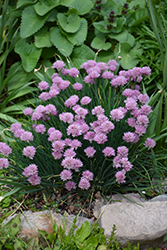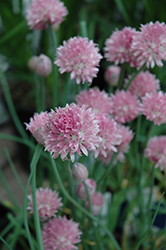It's all about ...
plants

Forescate Chives
Allium schoenoprasum 'Forescate'
Height: 12 inches
Spread: 16 inches
Sunlight:
![]()
![]()
Hardiness Zone: 2a
Other Names: Giant Flowered Chives, Common Chives
Description:
This is a large flowered variety of common chives; a low mound of grassy leaves with deep pink balls of color rising above in late spring; flowers and leaves are edible; great in containers or along borders
Ornamental Features
Forescate Chives has masses of beautiful balls of lightly-scented pink flowers at the ends of the stems from late spring to early summer, which are most effective when planted in groupings. Its fragrant grassy leaves remain green in colour throughout the season.
Landscape Attributes
Forescate Chives is an open herbaceous perennial with an upright spreading habit of growth. Its relatively fine texture sets it apart from other garden plants with less refined foliage.
This is a high maintenance plant that will require regular care and upkeep, and should only be pruned after flowering to avoid removing any of the current season's flowers. It is a good choice for attracting butterflies to your yard, but is not particularly attractive to deer who tend to leave it alone in favor of tastier treats. Gardeners should be aware of the following characteristic(s) that may warrant special consideration;
- Invasive
- Self-Seeding
Forescate Chives is recommended for the following landscape applications;
- General Garden Use
- Herb Gardens
Planting & Growing
Forescate Chives will grow to be about 12 inches tall at maturity, with a spread of 16 inches. It grows at a fast rate, and under ideal conditions can be expected to live for approximately 5 years. As an herbaceous perennial, this plant will usually die back to the crown each winter, and will regrow from the base each spring. Be careful not to disturb the crown in late winter when it may not be readily seen!
This plant does best in full sun to partial shade. It does best in average to evenly moist conditions, but will not tolerate standing water. It is not particular as to soil type or pH, and is able to handle environmental salt. It is highly tolerant of urban pollution and will even thrive in inner city environments. This is a selected variety of a species not originally from North America. It can be propagated by division; however, as a cultivated variety, be aware that it may be subject to certain restrictions or prohibitions on propagation.

